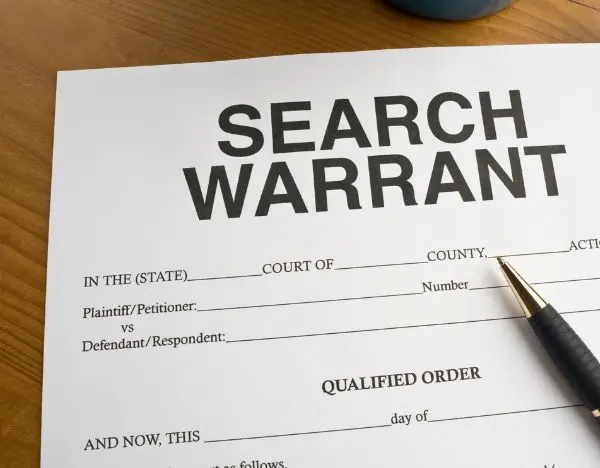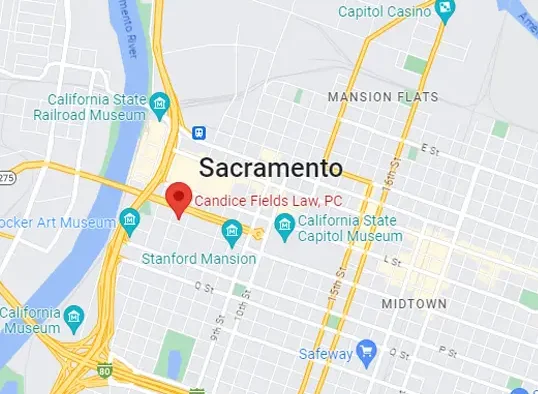What To Expect During a Federal Search Warrant Execution

The execution of a federal search warrant can be an overwhelming and stressful experience for any individual or business. At Candice Fields Law, PC, we understand that knowing what to expect and how to respond during this critical time can make a significant difference in protecting your rights and interests. This comprehensive guide will walk you through the process of federal search warrant execution and provide essential information about your rights and responsibilities.
Need legal assistance?
What are Federal Search Warrants?
Federal search warrants are essential tools in federal criminal investigations that authorize law enforcement to search specific locations for evidence. Here's what you need to know about these important legal documents:
- Federal Search Warrant: A court order signed by a federal magistrate judge that gives federal agents legal authority to search specific locations and seize particular items.
- Probable Cause: The legal standard required for a warrant, meaning agents must show reasonable belief that evidence of a crime will be found at the location.
- Scope of Search: The warrant must specifically describe both the places to be searched and the items to be seized, preventing general or unrestricted searches.
- Executing Agencies: Federal agencies like the FBI, DEA, or IRS Criminal Investigation Division are typically responsible for executing these warrants.
- Time Limitations: Federal search warrants must usually be executed within 14 days of being issued by the court.
- Documentation Requirements: The warrant must include details about the suspected criminal violation, location to be searched, and items agents can seize.
- Notice Requirement: In most cases, agents must announce their presence and provide a copy of the warrant to the property owner or occupant.
- Return Process: After execution, agents must provide an inventory of seized items and file it with the court.
- Constitutional Basis: Federal search warrants are governed by the Fourth Amendment, which protects against unreasonable searches and seizures.
- Challenging Validity: Search warrants can be challenged based on issues like lack of probable cause, incorrect information in the application, or improper execution.
Understanding federal search warrants is crucial for protecting your rights during federal investigations. If you're served with a federal search warrant, it's important to contact a federal criminal defense lawyer immediately to ensure your rights are protected throughout the federal criminal case process.
Common Reasons For a Federal Search Warrant

Federal agents may obtain search warrants during investigations of suspected federal crimes. Understanding these common triggers for federal search warrants can help you recognize potential legal exposure and the importance of maintaining proper compliance:
- Financial Fraud: Investigation of suspected wire fraud, bank fraud, securities fraud, or other schemes involving financial institutions or interstate commerce.
- Healthcare Fraud: Examination of medical billing practices, kickback schemes, or fraudulent claims submitted to Medicare or Medicaid.
- Drug Trafficking: Search for evidence of manufacturing, distribution, or sale of controlled substances across state lines or international borders.
- Tax Evasion: Investigation of suspected underreporting of income, hidden assets, or fraudulent tax returns.
- Money Laundering: Search for evidence of concealing illegal proceeds through legitimate business operations or financial transactions.
- Public Corruption: Investigation of bribery, kickbacks, or misuse of public funds by government officials or contractors.
- Cybercrime: Collection of digital evidence related to computer fraud, hacking, identity theft, or online exploitation.
- Environmental Crimes: Investigation of illegal disposal of hazardous waste, violations of environmental regulations, or wildlife trafficking.
- RICO Violations: Search for evidence of organized criminal enterprise activities or pattern of racketeering.
- Immigration Crimes: Investigation of document fraud, human trafficking, or employment of undocumented workers.
- Securities Violations: Search for evidence of insider trading, market manipulation, or unregistered securities offerings.
- Government Contract Fraud: Investigation of false claims, bid rigging, or other fraudulent practices involving federal contracts.
If federal agents execute a search warrant at your property, it's crucial to contact a federal criminal defense lawyer immediately. At Candice Fields Law, PC, we provide strategic guidance throughout federal investigations while protecting your constitutional rights and legal interests.
Your Rights During a Federal Search Warrant Execution
When federal agents execute a search warrant, you retain important constitutional protections. Understanding and asserting these rights appropriately can help protect your legal interests during this critical time:
- Right to Read the Warrant: You have the right to review the search warrant and verify its validity, including the areas to be searched and items to be seized.
- Right to Legal Representation: You can contact and have an attorney present during the search warrant execution to protect your interests.
- Right to Remain Silent: You are not required to answer questions beyond basic identifying information and can defer all inquiries to your attorney.
- Right to Observe: You may observe the search from a reasonable distance, as long as you don't interfere with the agents' activities.
- Right to Document: You can take notes, photos, or videos of the search process, provided this doesn't obstruct the agents' work.
- Right to Inventory: You must receive a detailed list of all items seized during the search warrant execution.
- Right to Property Protection: Agents must conduct the search reasonably and avoid unnecessary damage to your property.
- Right to Privacy: Areas not specified in the warrant cannot be searched without additional authorization or consent.
- Right to Privileged Protection: Attorney-client privileged materials should be protected and properly segregated during the search.
- Right to Refuse Consent: You can decline requests to search areas or items not covered by the warrant.
- Right to Copy: You are entitled to receive a copy of the search warrant and the inventory of seized items.
- Right to Property Return: You can request the return of seized items that are not necessary for the investigation.
Understanding and properly asserting these rights requires careful consideration of your specific situation. Contact Candice Fields Law, PC immediately during a federal search warrant execution for guidance on protecting your rights while maintaining appropriate cooperation with law enforcement.
What To Expect During a Federal Search Warrant Execution
The execution of a federal search warrant marks a critical moment that requires both understanding and careful handling. When federal agents arrive with a warrant, knowing how to respond can significantly impact your legal position and rights. Whether at your home or business, being prepared for this scenario helps ensure you navigate the process appropriately while protecting your interests.
Initial Contact and Entry
Federal agents typically execute search warrants in the early morning hours. They will announce their presence and authority, then present proper identification and the search warrant to the occupant or responsible party. This initial contact can be intimidating, but it's important to remain calm and cooperative while being mindful of your rights.
Presentation of the Search Warrant
Upon entry, federal agents must provide you with a copy of the search warrant. The warrant should clearly specify the areas to be searched and items that can be seized. Take time to carefully read the warrant, noting its scope and limitations. This document serves as your primary source of information about what the agents are authorized to do.
Securing and Controlling the Premises
Once inside, agents will secure the location and establish control over the area. They may restrict movement within the space and control who enters or exits. This procedure ensures both officer safety and evidence preservation. While this process occurs, occupants should stay calm and follow agent instructions.
Communication with Law Enforcement
During the search warrant execution, agents may ask questions or request information. Remember that you have the right to remain silent and the right to have an attorney present. While you should remain courteous, avoid making voluntary statements without legal counsel present. Any statements you make can be used in future legal proceedings.
Documentation of the Search Process
Federal agents will systematically search the authorized areas and document their findings. They should respect the scope limitations outlined in the warrant. You have the right to observe the search from a reasonable distance, though agents may restrict your movements to maintain security and preserve potential evidence.
Handling of Electronic Devices
Modern federal search warrants often include provisions for seizing and searching electronic devices. Agents may take computers, phones, tablets, and storage devices. They might also request passwords or access to digital accounts. Consider consulting with legal counsel before providing access to electronic information.
Treatment of Privileged Materials
If agents encounter potentially privileged materials, such as attorney-client communications, they should follow special procedures. These may include using a "taint team" to review such materials before investigators see them. Alert agents immediately if you believe they are accessing privileged information.
Seizure of Property and Documentation
Federal agents must provide an inventory of all items seized during the search. They should give you a receipt detailing what was taken. Review this inventory carefully and keep it for your records. Note any discrepancies or concerns about seized items.
Duration of the Search
The length of a federal search warrant execution varies depending on the size of the location and scope of the warrant. Searches can last several hours or even multiple days. Agents must conduct the search reasonably and without unnecessary delay or destruction of property.
Post-Search Procedures
After completing the search, agents will provide final documentation and may secure the premises if necessary. They must file a return with the court listing all seized items. You have the right to obtain a copy of this return. Document any damage to property or other concerns about how the search was conducted.
Legal Considerations and Next Steps
A federal search warrant execution often indicates an ongoing criminal investigation. Contact a federal criminal defense lawyer as soon as possible to protect your rights and interests. Your attorney can help review the warrant's validity, document any irregularities, and develop an appropriate legal strategy.
Business Continuation Planning
If the search occurs at a business location, develop a plan to maintain operations. Consider how to handle employee concerns, client communications, and essential business functions. Your legal counsel can help navigate these challenges while protecting your legal interests.
Document Preservation and Organization
Maintain organized records of everything related to the search warrant execution. This includes copies of the warrant, inventory lists, photographs of the scene, and notes about the search process. These documents may prove crucial for future legal proceedings.
Media and Public Relations
A federal search warrant execution may attract media attention. Develop a clear communication strategy in consultation with your legal counsel. Avoid making public statements that could compromise your legal position or ongoing business relationships.
Recovery of Property
Some seized items may be essential for personal or business operations. Work with your attorney to request the return of property not needed for the investigation. Federal agents should return items outside the warrant's scope or without evidentiary value.
Understanding these aspects of a federal search warrant execution helps protect your rights while maintaining appropriate cooperation with law enforcement. Remember that each situation is unique, and specific legal guidance is essential for navigating this complex process.
What To Do When Served with a Federal Search Warrant on Your Property
When federal agents arrive at your property with a search warrant, your immediate actions can significantly impact your legal position. Here are the essential steps to take to protect your rights while complying with law enforcement:
- Verify Agent Identity: Ask to see credentials from all agents present and write down names and badge numbers.
- Read the Warrant: Request a copy of the search warrant and carefully review the authorized search areas and items to be seized.
- Contact Legal Counsel: Immediately call a federal criminal defense lawyer before making any statements to agents.
- Document Everything: Take notes about the search process, including time of entry, areas searched, and items seized.
- Maintain Silence: Exercise your right to remain silent while being cooperative - avoid volunteering information or explanations.
- Monitor the Search: Observe the search from a reasonable distance while not interfering with agents' activities.
- Preserve Digital Access: If agents request passwords or access to electronic devices, consult with your attorney before providing them.
- Review the Inventory: Carefully examine the detailed list of seized items that agents must provide before departing.
- Record Property Condition: Take photos or videos of any damage caused during the search for future reference.
- Gather Contact Information: Obtain the lead agent's business card and contact details for follow-up questions.
- Protect Privileged Materials: Alert agents immediately if they attempt to seize attorney-client privileged documents.
- Maintain Business Operations: If at a business location, develop a plan to continue essential operations during and after the search.
Remember that while a federal search warrant execution can be stressful, maintaining professional composure while protecting your legal rights is crucial. Contact Candice Fields Law, PC for immediate assistance in managing this complex situation and developing an appropriate legal strategy moving forward.
What NOT To Do When Served With a Federal Search Warrant
When federal agents execute a search warrant, certain actions can seriously compromise your legal position or result in additional criminal charges. Here are crucial behaviors and actions to avoid:
- Obstruct the Search: Never attempt to block agents' access, hide items, or interfere with the search process as this may result in additional criminal charges.
- Destroy Evidence: Avoid deleting files, shredding documents, or disposing of any materials once agents have arrived or announced their presence.
- Provide Passwords Voluntarily: Don't offer passwords to electronic devices or access to digital accounts without first consulting your attorney.
- Make Voluntary Statements: Avoid explaining documents, business practices, or making casual conversation with agents without legal counsel present.
- Consent to Additional Searches: Don't allow agents to search areas not specified in the warrant unless directed by your attorney.
- Misrepresent Facts: Never lie to federal agents about the location of items or provide false information as this constitutes a federal crime.
- Discuss the Search: Avoid talking about the search warrant execution with employees, colleagues, or on social media platforms.
- Ignore the Inventory: Don't fail to review and retain the detailed list of items seized during the search.
- Act Hostile: Maintain professional composure and avoid confrontational or aggressive behavior toward agents.
- Leave the Premises: Don't abandon the property during the search unless specifically instructed by agents.
- Contact Target Subjects: Avoid alerting other potential investigation targets about the search warrant execution.
- Sign Documents: Don't sign any documents presented by agents without review by your attorney.
Acting improperly during a federal search warrant execution can have serious legal consequences. If federal agents arrive at your property, contact Candice Fields Law, PC immediately for guidance on protecting your rights while complying with the warrant's requirements.
How a Federal Criminal Defense Lawyer Can Help During a Federal Search Warrant
When federal agents arrive with a search warrant, having skilled legal representation can make a crucial difference in protecting your rights and managing potential legal consequences. At Candice Fields Law, PC, we provide comprehensive support throughout this challenging process, offering immediate intervention and strategic guidance when you need it most.
Immediate Response and On-Site Presence
At Candice Fields Law, PC, we understand that time is critical when federal agents arrive with a search warrant. Our team responds quickly to arrive at the scene, providing immediate legal representation and ensuring your rights are protected throughout the search process. Our presence helps maintain professional interactions while preventing unauthorized questioning or overreach.
Search Warrant Analysis and Oversight
We carefully review the search warrant to verify its validity, scope, and limitations. Our attorneys monitor the entire search process to ensure federal agents stay within the authorized parameters. This oversight includes documenting the areas searched, items seized, and any potential irregularities in the warrant's execution.
Protection of Privileged Materials
During federal searches, we identify and safeguard legally privileged information, including attorney-client communications and confidential business documents. Our team works directly with federal agents to establish proper protocols for handling sensitive materials, ensuring they are properly segregated and protected from improper review.
Communication Management
We handle all interactions with federal agents on your behalf, providing a professional buffer that protects your interests. This includes coordinating the return of non-essential items, addressing concerns about search procedures, and managing any media inquiries that may arise from the search warrant execution.
Evidence Documentation and Preservation
Our firm maintains detailed records of the entire search process, creating a comprehensive account of all seized items and searched areas. We photograph relevant locations, document agent conduct, and preserve evidence of any property damage that occurs during the search.
Business Continuity Management
For our business clients, we focus on maintaining critical operations during and after the search. This includes advising on employee communications, ensuring access to essential business materials, and developing strategies to protect client relationships and business reputation throughout the process.
Digital Evidence Protection
Modern federal searches often focus heavily on electronic evidence. We oversee the seizure of digital devices, manage access to cloud data, and ensure proper handling of electronic materials. Our approach protects both your digital assets and your legal interests throughout the search process.
Strategic Investigation Response
Beyond the immediate search, we develop comprehensive strategies to address potential criminal charges and protect your interests. This includes evaluating evidence suppression opportunities, identifying constitutional violations, and preparing for possible grand jury proceedings.
Asset and Property Protection
We work diligently to protect your assets during the search process, expediting the return of essential items and documenting any business interruption losses. Our team ensures that agents respect property rights while fulfilling their warrant obligations.
Compliance and Prevention Guidance
Our firm helps prevent future legal issues by analyzing current compliance programs and identifying potential vulnerabilities. We provide guidance on best practices and help implement improved procedures to protect against future legal challenges.
Prosecutor Negotiations
We engage with federal prosecutors to address procedural concerns, negotiate the return of seized items, and present exculpatory information when appropriate. Our experience in federal criminal defense allows us to advocate for your interests throughout the investigation effectively.
Long-term Legal Strategy
Throughout the process, we develop and implement comprehensive legal strategies tailored to your specific situation. This includes preparing for potential litigation, exploring resolution options, and protecting your interests in any parallel civil proceedings.
Contact and Consultation
If federal agents arrive with a search warrant, contact Candice Fields Law, PC immediately. Our experienced legal team provides the strategic guidance and protection needed during this critical time. We understand the complexities of federal criminal investigations and stand ready to defend your rights throughout the entire legal process.
Get Immediate Legal Support During a Federal Search Warrant
If federal agents are executing a search warrant at your home or business, time is critical. Contact Candice Fields Law, PC for immediate assistance. Our federal criminal defense team stands ready to protect your rights and provide strategic guidance throughout this process.





